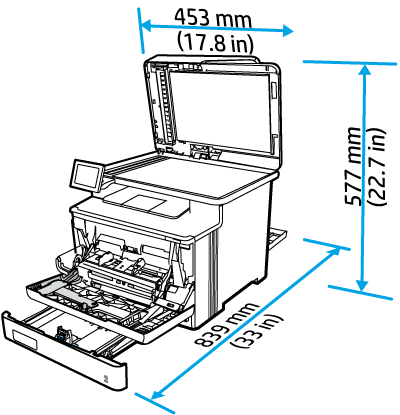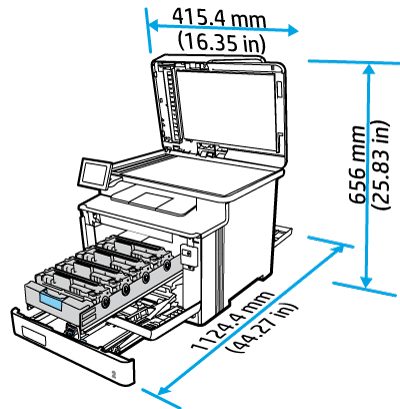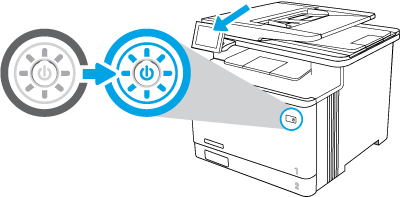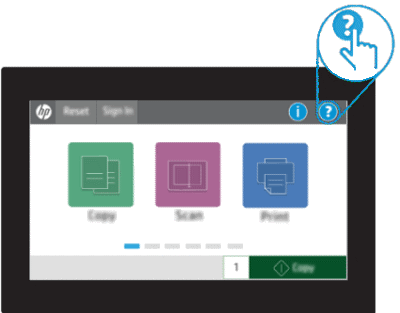This document explains how to set up the physical parts of the printer. Complete these steps before installing the printer
software on the computer.
If the printer hardware is already set up, see the Links to software installation instructions section at the end of this document for help with software installation.
Follow these steps to set up the printer:
-
-
Select a site to place the printer that meets the following specifications:
-
A sturdy work surface in a well-ventilated and dust-free area, and away from direct sunlight
-
Temperature range: 10° - 32.5° C50° to 91° F
-
Humidity range: 10% - 80%
-
Allow sufficient space around the printer to open all doors and trays. Refer to the space requirements listed below for your
specific printer model.
-
M430f and M431f models:
CAUTION:
The M430f and M431f models each weigh 13.01 kg28.68 lb. HP recommends that two people move the printer.
Space requirements (M430f and M431f models)

-
M480f model:
Note:
The M480f model weighs 23.3 kg51.37 lb. HP recommends that two people move the printer.
Space requirements (M480f model)

-
Take the HP printer out of the box, and then verify that the contents match this illustration:
Contents of the box

-
Remove all tape and packing material from the printer.
Note:
HP recommends recycling the packaging materials.
Remove the tape

-
The following information describes how to load paper into Tray 2.
Note:
This tray holds up to 250 sheets of 75 g/m220 lb paper.
-
Open Tray 2.
Open Tray 2

-
Adjust the paper-length and paper-width guides by squeezing the adjustment latches and sliding the guides to the size of paper
being used.
Extend the paper guides

-
Load paper into the tray and verify that the paper guides lightly touch the stack, but do not bend it.
Note:
To prevent jams, do not overfill the tray. Make sure the top of the stack is below the tray-full indicator.
Load paper

-
Close the tray.
Close Tray 2

-
Connect the network cable (optional):
If you are connecting to a network, connect the network cable now. If not, continue to the next step.
Note:
A network cable is not included with the printer.
Connect network cable

CAUTION:
Do not connect a USB cable now. To use a USB cable to connect the printer to the computer, connect it when prompted during software
installation.
Do not connect a USB cable yet

-
Connect a phone cord for fax (optional):
Connect a phone cord for fax between the printer and the phone jack.
The printer uses an analog fax device. HP recommends using the printer on a dedicated analog telephone line.
Note:
Some countries/regions might require an adapter for the phone cord that came with the printer.
Connect the phone cord for fax

-
Connect the power cable and turn on the printer:
-
Connect the power cable between the printer and a grounded AC outlet.
Note:
To prevent damage to the printer, use only the power cable that is provided with the printer.
CAUTION:
Make sure your power source is adequate for the printer voltage rating. The voltage rating is on the printer label. The printer
uses either 100-127 Vac or 220-240 Vac and 50/60 Hz.
Connect the power cord

-
Press the Power button to turn on the printer and then wait for it to initialize.
Turn on the printer

-
On the control panel Initial Setup screen, set the language, the location, the date/time format, and other features.
For advanced setup for network-connected printers, enter the printer IP address in the address bar of a web browser after
the printer is in a ready state. To find the IP address on the printer control panel, select the Information icon  , and then select the Network icon
, and then select the Network icon  .
.
Note:
For information about advanced configuration of network-connected printers, click the link below for your printer model.
-
Enable the USB port:
The USB port is disabled by default and must be enabled from the printer control panel.
Follow these steps to enable the USB port:
-
From the Home screen on the printer control panel, swipe right, and then touch Settings.
-
Touch General > Enable Device USB > Enabled.
-
Follow the instructions for your operating system:
Note:
A USB cable is not included with the printer.
-
Verify that the printer functions:
To verify that the printer functions, complete the following steps:
-
From the Home screen on the printer control panel, touch Reports.
-
Touch Configuration/Status Pages.
-
Touch Configuration Page, and then touch Print to print the Configuration and Jetdirect pages.
If the printer is connected to a network, find the IP address on the Jetdirect page.
-
IPv4: If the IP address is 0.0.0.0, or 192.0.0.192, or 169.254.x.x, manually configure the IP address. Otherwise, the network
configuration was successful.
-
IPv6: If the IP address begins with "fe80:," the printer should be able to print. If not, manually configure the IP address.
Note:
The Configuration Page includes firmware version information that you can refer to when updating the firmware.
-
Update the printer firmware (Recommended):
HP provides firmware updates for printers to help address any known issues, enhance security, and add new features throughout
the life of the printer.
Before using your printer, HP strongly recommends that you upgrade to the latest firmware version. View the following video for information on how to upgrade the firmware.
Note:
Check with the network administrator before updating the printer firmware.
For additional information on updating the printer firmware, see Update the printer firmware.
Links to software installation instructions
After completing the previous setup steps, install the printer software using one of the following methods:
-
Method one: Download HP Easy Start (Windows and macOS clients)
-
Go to 123.hp.com and click Download.
-
Follow the onscreen instructions to download and launch HP Easy Start, and then follow the onscreen instructions to install
the software.
-
Method two: IT managed setup (Windows only - clients and servers)
Visit hp.com/go/upd to download and install the HP Universal Print Driver.
Find more information
For more information, click the link below for your printer model.
Touch the Help icon  on the printer control panel to access Help topics.
on the printer control panel to access Help topics.
Touch the Help icon

on the printer control panel to access Help topics.

